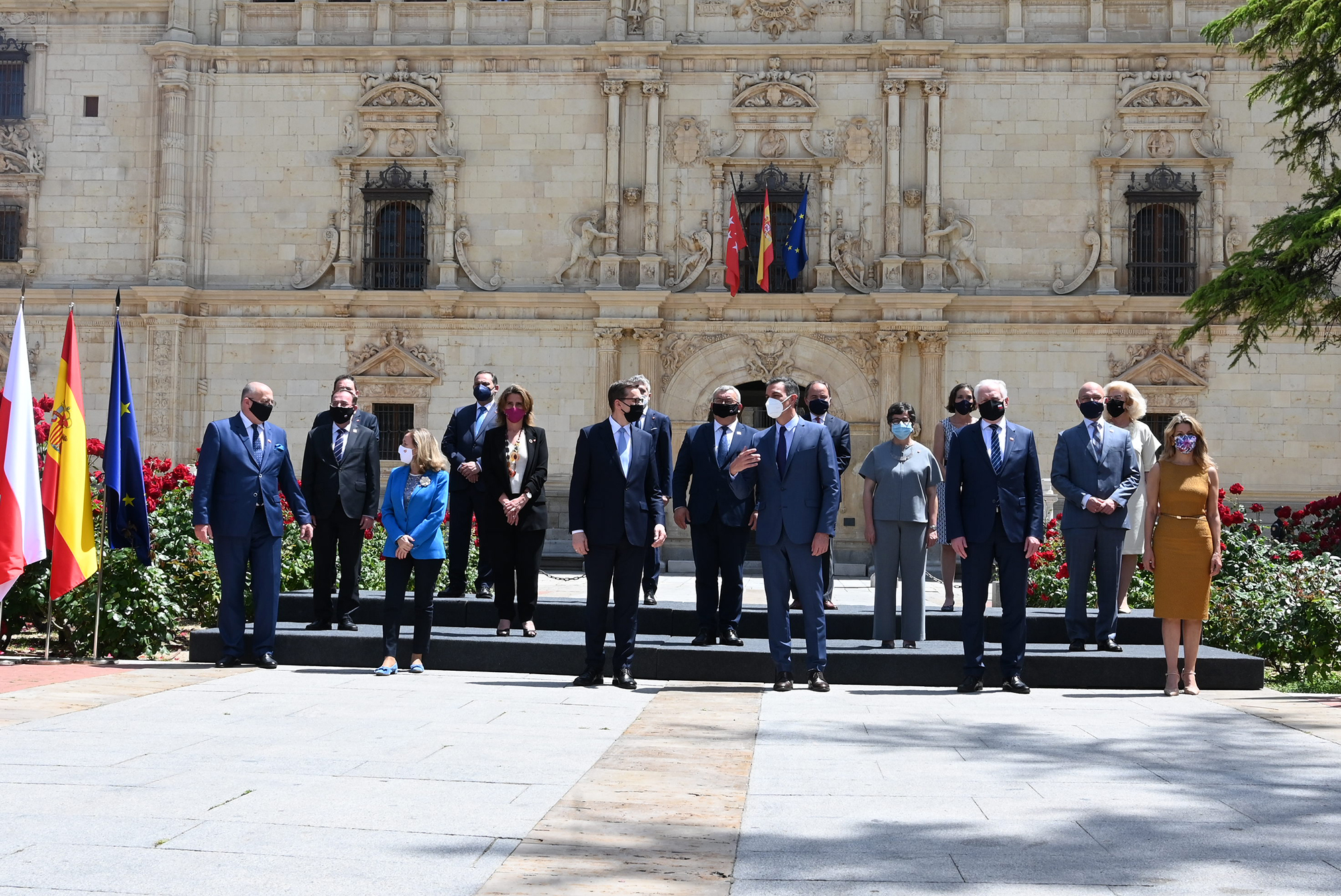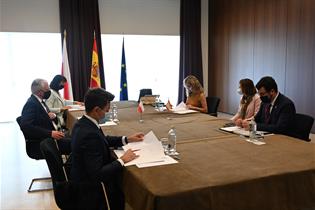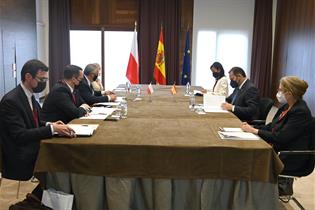Thirteenth Spanish-Polish Summit in Alcalá de Henares
Sánchez is committed to consolidating bilateral relations between Spain and Poland
President's News - 2021.5.31
Alcalá de Henares (Madrid)
During the meeting, Sánchez and Morawiecki showed the good relationship that exists between their governments, with different political approaches on some issues, but they have noted a great deal of agreement on the management of the pandemic and recovery, the green and digital transitions, the demographic challenge and the extensive rural area, and they have addressed current European issues such as social policy, climate and the new migration pact.
The head of the Executive has stressed that the summit allowed "synergies in the respective national recovery plans to return to the path of growth and economic and social recovery, facing the important challenge of green and digital transitions" to be sought. In this regard, both leaders noted the solid economic and trade relations between the two countries, which include Spanish intra-industrial exports, and the investments of Spanish companies in Poland in renewable energies, telecommunications and industrial construction, as well as the more than 500 Spanish companies operating in Poland.
Spain and Poland, the fourth and fifth largest European economies respectively, share similarities such as territorial size, population figures, geographical position on the EU's external border, and rapid development following their accessions to the EU. In this respect, Sánchez stressed the need to "strengthen the EU's relationship with its Eastern neighbours", about whom he praised the work being carried out within the framework of the Eastern Partnership, and pointed out that "the level of ambition should be equal" with respect to the Southern Neighbourhood.
"We share the commitment to transatlantic security as NATO partners and a common space, the European Union, in which we do not always have the same vision, but in which we agree on some important debates such as the necessary boost to recovery, a just transition and the defence of the internal market and cohesion policy", the President of the Government stressed.
The ties between Spain and Poland also extend to the societies and their citizens, with a large exchange of tourists, students and workers and a notable interest in the culture of the respective countries, as shown by the presence of two Cervantes Institutes in Poland and the Polish Institute in Madrid.
 Foto: Pool Moncloa/Borja Puig de la Bellacasa
Foto: Pool Moncloa/Borja Puig de la Bellacasa
The Summit was attended by the Second Vice-President and Minister for Economy and Digital Transformation, Nadia Calviño; the Third Vice-President and Minister for Work and Social Economy, Yolanda Díaz; the Fourth Vice-President and Minister for Ecological Transition and Demographic Challenge, Teresa Ribera; the Minister for Foreign Affairs, European Union and Cooperation, Arancha González Laya; the Minister for Home Affairs, Fernando Grande-Marlaska; the Minister for Transport, Mobility and Urban Agenda, José Luis Ábalos; the Minister for Industry, Trade and Tourism, Reyes Maroto; and their Polish counterparts.
Five Memoranda of Understanding and one collaborative programme
The importance of the ambitious initiatives set out in the Joint Declaration, in which both countries committed to further strengthening their existing economic, trade and cultural relations, has been underlined by the signing of five MOU and a partnership programme.
In the economic sphere, Calviño and her counterpart highlighted the need to implement the recovery plans and the European NextGenerationEU mechanism in streamlined manner. Spain and Poland also share an interest in completing the Banking Union and agree on the need to revise tax rules to make them more flexible and promote economic growth.
 Foto: Pool Moncloa / Borja Puig de la BellacasaYolanda Díaz held a meeting with her Polish counterpart on the coordination of economic and labour policies. In this regard, they addressed the effects of the pandemic, the deployment of measures such as ERTEs, and the implementation of the Distance Working Law in Spain. The ministers placed particular emphasis on the challenge of training and re-skilling workers in the context of digital and economic transformation.
Foto: Pool Moncloa / Borja Puig de la BellacasaYolanda Díaz held a meeting with her Polish counterpart on the coordination of economic and labour policies. In this regard, they addressed the effects of the pandemic, the deployment of measures such as ERTEs, and the implementation of the Distance Working Law in Spain. The ministers placed particular emphasis on the challenge of training and re-skilling workers in the context of digital and economic transformation.
Teresa Ribera and the Polish minister for the sector analysed the work of both countries to ensure a just transition that generates new opportunities for economic activity and employment in the regions most affected by the closure of coal-fired power plants. These measures include channelling investment to restore areas that are in decline, support for innovative industrial projects and the development of energy efficiency and renewable energy projects, valuing the potential for collaboration between Spanish and Polish companies.
Arancha González Laya met with her Polish counterpart to sign three MOU and an agreement. The memoranda cover the regularisation of sectoral consultations and exchange of officials; cooperation between diplomatic schools; and cyber-security. It was also agreed to implement a cooperation programme in the fields of culture, education and science for 2021-2024.
During the meeting with his counterpart, Fernando Grande-Marlaska discussed cooperation in security matters, the future European Pact on Migration and Asylum, the Schengen Area and cross-border cooperation. The Minister for Home Affairs highlighted the intense and fruitful collaboration between the state security forces of both countries and Spain's commitment to strengthen operational coordination in the fight against all forms of crime.
 Foto: Pool Moncloa / Borja Puig de la BellacasaSpain and Poland have shown interest in increasing cooperation in the development of transport infrastructure. For this reason, José Luis Ábalos and his Polish counterpart signed a memorandum to develop the Solidarity Transport Hub project, whereby the parties undertake to explore means of cooperation in areas such as the construction and supervision of railway infrastructure and railway traffic management.
Foto: Pool Moncloa / Borja Puig de la BellacasaSpain and Poland have shown interest in increasing cooperation in the development of transport infrastructure. For this reason, José Luis Ábalos and his Polish counterpart signed a memorandum to develop the Solidarity Transport Hub project, whereby the parties undertake to explore means of cooperation in areas such as the construction and supervision of railway infrastructure and railway traffic management.
During their meeting, Minister Reyes Maroto and her Polish counterpart discussed economic cooperation, Mercosur, strategic autonomy, the Important Projects of Common European Interest and the border carbon adjustment mechanism. Ministers signed an MOU on industrial cooperation, which includes the study of sustainability and digital solutions for industry, metrology, and supplies of active ingredients.
The President of the Government, after signing all the agreements, concluded his speech by stressing: "The main message we take away from this summit is the potential of our relationship, of mutual learning and collaboration in economic and recovery fields".
Non official translation




